Suman Gujral - What We Don’t Talk About
22 March - 21 April 2021
(Window and online exhibition only. The gallery remains closed until further notice)Reflecting on the personal and political events which shape us, Suman Gujral’s practice sheds light on the cycle of war, genocide and loss rooted in colonial history.
Her works explore both the historical and contemporary issues and narratives surrounding refugees, drawing on the experiences of her own family who were forcibly displaced by the Partition of India in 1947. Unable to return home, they grew up with the memory of lost family members, surrounded by refugee camps. These are events which, Gujral has recently come to understand, have profoundly affected the lives and experiences of her family and millions of others.

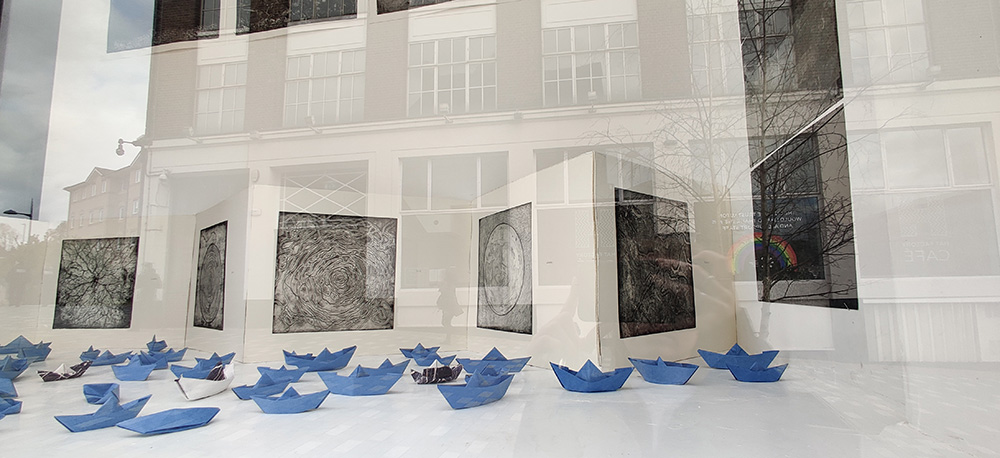
Drawing on these stories of displacement, Gujral’s series Syriascapes responds to the catastrophe of the Syrian civil war. Working with imagery directly related to the war itself, the works speak of ruined landscapes and look deeper at the upheaval and destruction of lives, by bombing and ongoing conflict.
Gujral uses print as her preferred medium - with its strong connections to protest and political commentary. She utilises unpredictable printing processes, which underscore her themes and echo her thought processes: traditional acid etching leaves intentional and accidental marks on the printing plates – as life experiences do on individuals and communities; solar etching incorporates photographic techniques, while her monoprints can produce spontaneous and unplanned works. The incorporation of bookbinding materials underline Gujral’s desire to tell stories and emphasise the narrative qualities of her new works.
Creating works which are both autobiographical and universal, Gujral examines identity, displacement, notions of home and the human ability to survive trauma. She uses her position as an artist to give voice to, and generate discussion around, unspoken memories and disrupted relationships, many of which are considered too painful to talk about.
Suman Gujral (b.1962) completed an MA in Fine Art at the University of Hertfordshire in 2018 and has since shown her work in both group and solo exhibitions across London and Hertfordshire. In 2020 Gujral was awarded a bursary from A-N and is currently mentored by Lewis Biggs, formerly director of Tate Liverpool and currently of Folkestone Triennial. She is part of the Curatorial Consultation Board at St Albans Museum + Gallery she has an upcoming solo show at Parndon Mill, Essex in Summer 2021.
www.sumangujral.com / @print_makerlady

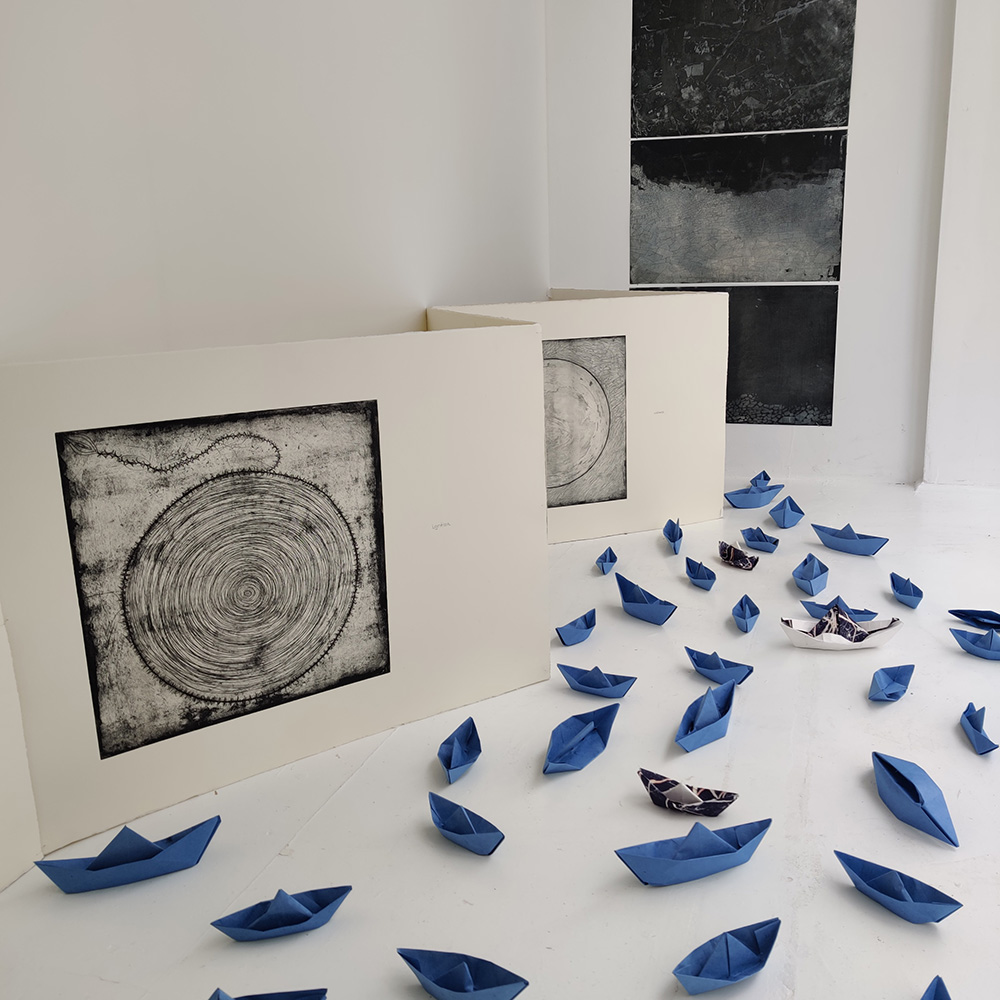
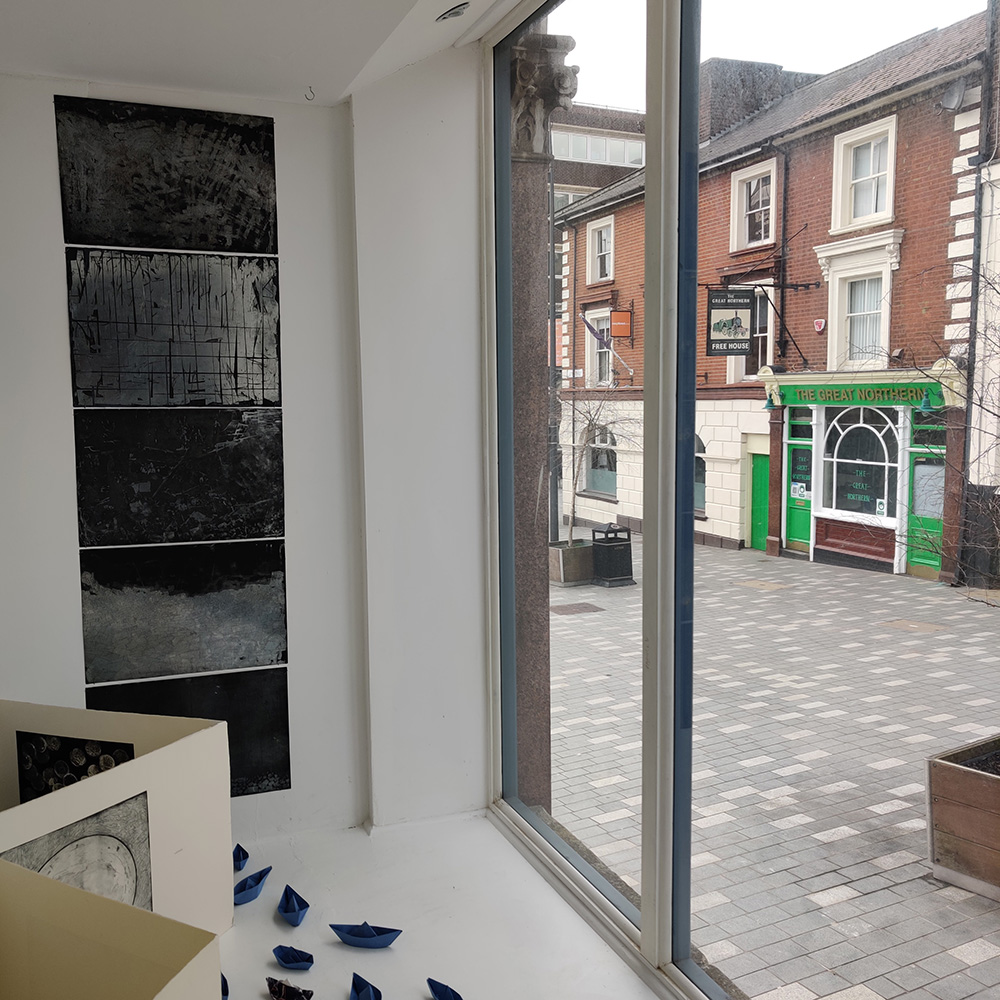

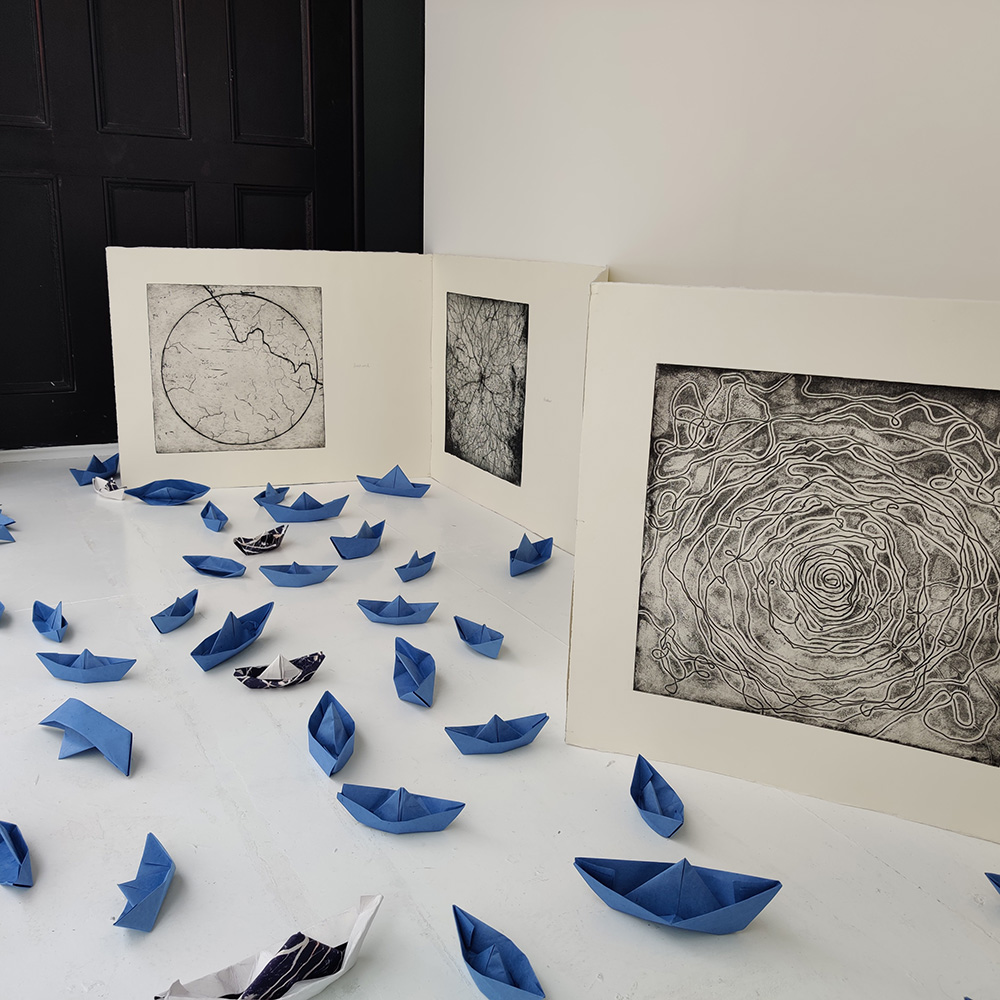

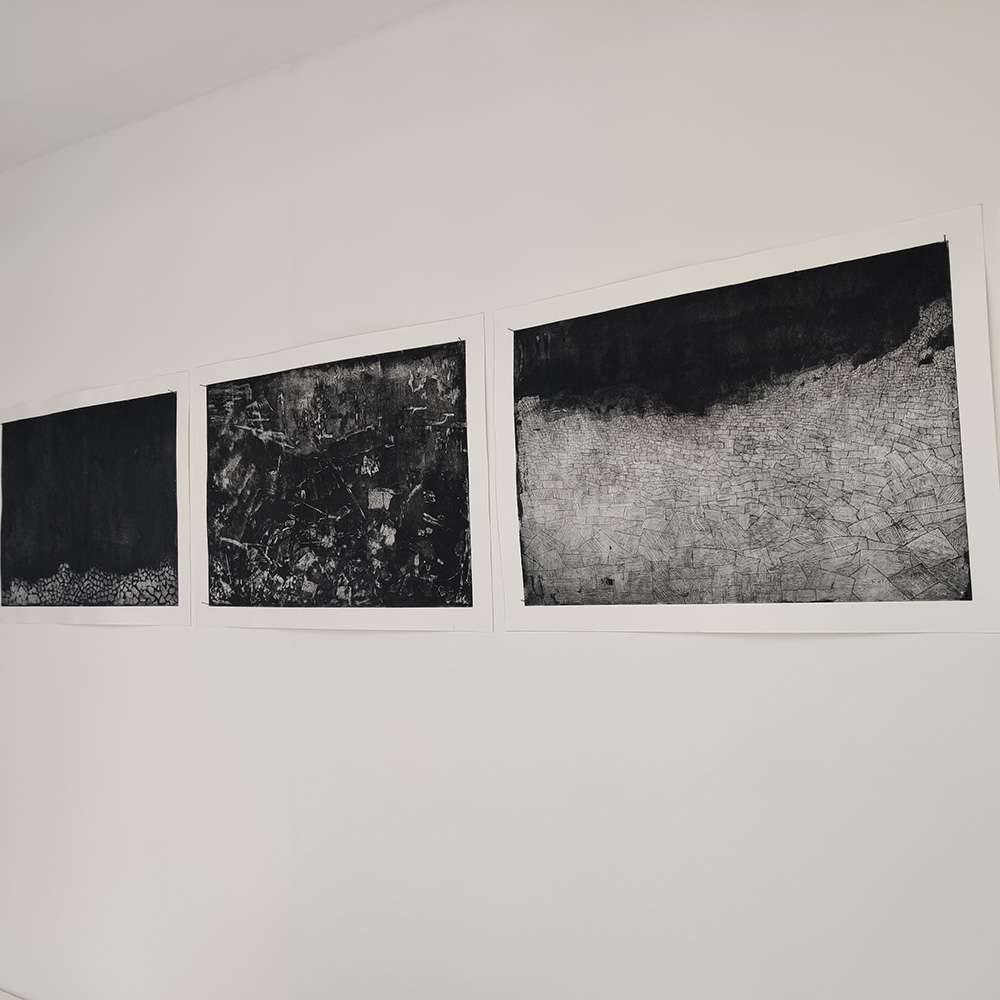
In-conversation with Suman Gujral & Curator Sammy Maitland

SM: Could you start by giving us an overview of your practice, and also a little about what you’ve been working on recently?
SG: My history as an immigrant and child of refugees has shaped my practice. I did an MA in 2016 which I started intending to reconnect to the Indian side of my heritage by researching into Indian art history - about which I knew nothing. My research led me to realise the massive impact of the 1947 partition not only on art in India, but all aspects of life on the sub-continent. This led to conversations with my mum about her experiences for the first time in years and I began to understand the impact on our family of this forcible displacement. I am very interested in research into post-memory, where descendants of those who have experienced traumatic events absorb the effects of that trauma almost as if they had witnessed it themselves. I know that my own tendency to be anxious has come from my mum, who was left by Partition with a strong sense of uncertainty and a compulsion to guard against danger. During lockdown, I started to record my experiences through poetry and am currently experimenting with how to show poetry and visual work together.
SM: Your practice explores crucial issues surrounding displacement, the lives of refugees and climate change while also being autobiographical. Has your artistic practice always been very personal for you and how important is it that your work sheds light or starts conversations about these issues?
SG: My practice has always been very personal. In the early days, my work was inspired by the landscape but based on where I lived, worked and went on holiday. Understanding my history has now led me to make work about the current migration crisis. I see the parallels between my story and the situation of migrants. It concerns me that, according to the UNHCR, we now have someone being forcibly displaced by war or climate change, every 2 seconds and the implications of this for future generations. I feel that as an artist, I am in a unique position to cast light on these issues and perhaps even promote change. People come forward and tell me their own stories after seeing my work. It is really important to me that my work stimulates people to think about their own histories and how connected we are as human beings.
SM: The processes and materials you use often have connections to the subject matter of your work. Can you tell us a bit more how you select which print processes or materials to use – or is your approach quite experimental?
SG: Subject matter guides materials for me. It is often instinctive. I start to think about the story I want to tell and that leads me to the process. I have recently started to work with stitch and found it to be very meditative. Often the work goes in unexpected directions because of what I can do with the materials. Etching is my most frequently used medium because the way the acid leaves marks on the plate, echoes how life leavs its traces on us. It’s a reminder that we can plan and hope but we can’t control everything. It also reminds me that we are resilient and even when unexpected things happen we can survive and thrive in new landscapes.
SM: You’ve recently been working on a lot of poetry – can you tell us about what led you to start writing and how the poems fit within your practice?
SG: I used to write a lot of poetry in my teens but stopped as I got older. During Lockdown, I struggled, as did many people, and started writing poetry again to process what was happening. I also realised that it is great way of recording my family history. It has brought home how important stories are for me and I have come to think of myself as a storyteller. Lots of people have reached out to me to tell me that my poetry resonates with them and shared their own stories.
SM: The past year has been difficult due to the pandemic, but also due to the increased need for conversations and action around Black Lives Matter, women’s rights and the ongoing safety and human rights concerns for refugees - amongst other ongoing social and political issues. Has the past year changed the way you work or changed the kind of work that you’ve been making?
SG: There have been times when I have felt overwhelmed by everything! Luckily, I had just started working with my mentor, Lewis Biggs, who has been a great support and got me back into the studio when I felt like hiding! It was after a conversation with him that I started writing again for the first time in 42 years. The poetry also led me to set up a collective of SE Asian women artists, called Collectively Kind. Several SE Asian women artists contacted me after seeing my poetry saying that it resonated with them. I suggested we set up a group, where we are now exploring our shared history, and finding our voices. Although Lockdown had many negative aspects, it led to this group which has been a massive support. Also, because of Zoom events, I have been able to make other connections which would not have been possible if I had had to travel.
SM: Finally, we’d love to know what you have coming up this year?
SG: I am starting to make artists books combining poetry and prints which I hope to show later this year. I am in conversation with Letchworth Gurdwara about an exhibition with them exploring how to bridge the gap between those who settled here in the 50s and 60s and the younger generation. I have an exhibition coming up at Parndon Mill called Light and Shadow, about how life affects us. Collectively Kind, are planning an exhibition called 'I Am Speaking Now'. I’ve also been shortlisted for the Contemporary print prize at Fen Ditton Gallery, and am in the I Matter exhibition at Babylon Arts which is a response to Black Lives Matter. I realised that for me art was no longer just about making work but having a voice and giving a voice to those who feel marginalised.

